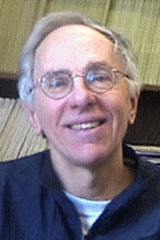Medical Center Professor, Faculty Senator, Expert in Charged Particles Dies

June 29, 2006
Philip A. Knauf, Ph.D., a distinguished Professor in the Department of Biochemistry and Biophysics at the University of Rochester Medical Center, died Sunday, June 25, after a brave fight with lymphoma. He was 64.
In 26 years at the University of Rochester Medical Center, Knauf was a respected teacher, biophysicist and leader in the Faculty Senate, of which he was co-chair in 2003-2004. Research colleagues, here and worldwide, were impressed by his consistent ability to create new ways to study the fundamental function of red and white blood cells. Fellow senators praised his leadership, his profound respect for other faculty and his love for the University.
An outstanding scholar from early on, Knauf graduated summa cum laude from Boston College in 1963. After completing biophysics training at the Universitat des Saarlandes in Homberg, Germany, in 1966, Knauf earned his Ph.D. in Biophysics from the University of Rochester in 1970. He then spent the 1970s as an associate professor within the University of Toronto departments of Medical Biophysics and Radiation Biology, before returning to University of Rochester Medical Center as an associate professor in the Department of Biophysics in 1980. He became a full professor in 1984, and had been here since.
As a researcher, Knauf was a pure basic scientist. His lab was primarily concerned with understanding how red and white blood cells transport charged particles across cell membranes, a job essential to their healthy function. He used state-of-the-art measurement techniques, some of which he invented, to identify the structures of proteins that transport negatively charged particles (negative ions).
“Phil Knauf’s work was valuable because it furthered our basic understanding of human cells,” said Marshall Lichtman, M.D., professor of Medicine and Biochemistry and Biophysics at the Medical Center. “How cells interact with their environment was Phil’s highly specialized area of expertise, with the potential to improve understanding of diseases, such as cystic fibrosis and certain inherited anemias, in which faulty transmembrane transport is in play.”
In terms of research achievements, his excellence is reflected in an impressive, long-term record of publication in leading biochemistry, cell biology and physiology peer-reviewed journals, and in stints as editor at the American Journal of Physiology, Cell Physiology and News in Physiological Sciences.
Along with his involvement as teacher and researcher, Knauf was a leader in the University of Rochester Faculty Senate from 2002 on, where he served on several committees. The Senate watches over the state of the University, and advocates for its development and welfare along with the president and the provost. Knauf had a deep love for the Senate and the University and argued forcefully on its behalf as a senator, according to colleagues.
“Phil’s leadership came at a challenging time for the University and the Senate, with lots of debate on matters central to the future of the University,” said Gerald Gamm, Ph.D., associate professor of political science and history and chair of the Department of Political Science at the University of Rochester, who served as co-chair of the Senate with Knauf in 2003-2004. “Phil was a graceful and principled leader who treated people who disagreed with him with an abiding respect. It was a pleasure to disagree with him because you learned from him and grew.” Gamm said Knauf handled his illness with the same grace and humor.
Knauf is survived by his wife, Suzanne; his three daughters, Victoria Sabourin, Alison Knauf and Jocelyn Knauf; and by three grandchildren. A memorial service has been scheduled for Saturday, Aug. 5, at 1:00 p.m. at the First Unitarian Church, 220 Winton Road South. Contributions in his name can be made to the Leukemia and Lymphoma Society of Rochester, Gilda’s Club, 225 Alexander St., or online at www.gildasclubrochester.org.